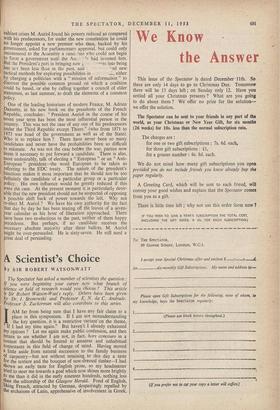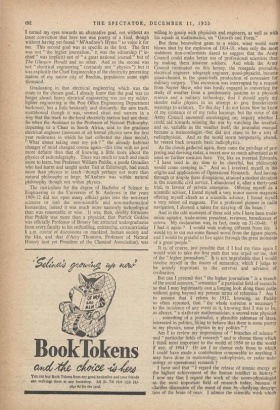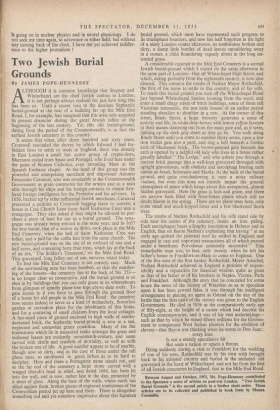A Scientist's Choice
- Y SIR ROBERT WATSON-WATT The Spectator has asked a number of scientists the question 4 you were beginning your career now what branch of science or field of research would you choose ? This article s Sir Robert Watson-Watt's reply. Others have been given by Dr. 1. Bronowski and Professor E. N. da C. Andrade. Professor S. Zuckerman will also contribute to this series.
AM far from being sure that I have any fair claim to a place in this symposium. If I am not misunderstanding the key question, it is a restrictive variant' on the theme, If I had my time again." But haven't I already exhausted My options ? Let me again make public confession, and then return to see whether I am not, in fact, hors contours in a contest that should be limited to amateur and unhabitual contestants in this field of change of mind. Having moved a little aside from natural succession to the family business of carpentry—but not without retaining to this day a taste for the texture and the bouquet of new-dressed timber—I had shown an early taste for English prose, so my headmaster tried to steer me towards a goal which now shines more brightly to me than it did in the early nineteen hundreds, nothing less than the editorship of the Glasgow Herald. Fond of English, liking French, attracted by German, despairingly repelled by the archaisms of Latin, apprehensive of involvement in Greek, I turned my eyes towards an alternative goal, not without an inner conviction that here too was poetry of a kind, though without having yet found " M'Andrew's Hymn " to voice it for me. This second goal was as specific as the first. The first was not " the higher journalism," it was the editorship (" in- chief " was implicit) not of " a great national journal ' but of The Glasgow Herald and no other. And so the second was not " electrical engineering " (certainly not " physics ") but it was explicitly the Chief Engineership of the electricity generating station of my native city of Brechin, population, some eight thousand.
Graduating in that electrical engineering which was the route to the chosen goal, I already knew that the goal was no longer, ahead; heavy electrical engineering was not my métier, lighter engineering in the Post Office Engineering Department beckoned, but a little hesitantly and obscurely; the new track, southbound though it was, seemed strait and narrow in a way that the track to the local electricity station had not done. So when the Assistant to the Professor of Natural Philosophy, departing to a Chair in South Africa, said to the graduate electrical engineer (innocent of all formal physics save the first year rudiments in which he had collected the class medal), " What about taking over my job ? " the already habitual changer of mind changed course again—this time with no goal more definite than that of knowing a little more 'about the physics of radiotelegraphy. There was much to teach and much more to learn, but Professor William Peddle, a gentle Orcadian who had learnt and taught under Tait at Edinburgh, had much more than physics to teach—though perhaps not more than natural philosophy at large; M'Andrew was within natural philosophy though not within physics.
The curriculum for the degree of Bachelor of Science in Engineering in the University of St. Andrews in the years 1909-12 did not open many official gates into the not-exact sciences or into the non-scientific and non-mathematical humanities, indeed it was much more narrowly technological than was reasonable or wise. It was, then, doubly fortunate that- Peddle was more than a physicist, that Patrick Geddes was officially Professor of Botany but attracted undergraduates from every faculty to his enthralling, entrancing, extracurricular 8 a.m. course of discussions on mankind, human society and the like, and that d'Arcy Thomson, Professor of Natural History (not yet President of the Classical Association), was willing to gossip with physicists and engineers, as well as with his equals in mathematics, on " Growth and Form."
But these benevolent gates to a wider, wiser world were blown shut by the explosion of 1914-18, when only the most stubborn non-conformists dared to suggest that the Army Council could make better use of professional scientists than: by making them amateur soldiers. And while the Army Council ruminated on this heresy, the renegade journalist, electrical engineer, telegraph engineer, quasi-physicist, became quasi-chemist in the quasi-bulk production of novocaine for military surgery. This excursion was interrupted by a request from Napier Shaw, who was busily engaged in converting the study of weather from a gentlemanly pastime to a physical science and a military technology, that I should apply my slender radio physics in an attempt to give thunderstorm warnings to aviators. To this day I do not know how he knew of my existence or of my radio leanings, but the voice of the Army Council answered encouraging my inquiry whether I could aid towards winning the war by watching the weather, and so, variable as the weather itself, the journalist manqud became a meteorologist—but did not cease to be a sort of radiophysicist. And as the world storm temporarily abated, he veered back towards basic radiophysics.
As the clouds gathered again, there came the privilege of pro- posing and devising radar, a secret now so much advertikd as to need no further mention here. Yet, like an inverted Edwards, " I have tried in my time to be cheerful, but philosophy would come creeping in." And so I involved myself in the origins and applications of Operational Research. And having, through or despite these divagations, attained a modest elevation in the scientific civil service, I abandoned it, after a thirty-year trial, in favour of private enterprise. Offering myself as a scientific adviser, I found myself a very minor movie magnate; offering myself afresh as a scientific advisor, I found myself a very minor oil magnate. For a professed pioneer in radio navigation, I showed a talent for straying off the beam !
And in the odd moments of these odd jobs I have been trade- union agitator, trade-union president, reviewer, broadcaster et cetera. My declaration was, in fact, made on 31-10-48: " If I had it again ? I would wish nothing different from life. I would try to cut out some flawed wood from the jigsaw pieces. and I would be grateful to live again through the great moments of a great people."
It is, of course, just possible that if I had my time again I would wish to take the first path that was urged on' me, that of the " higher journalism." It is not improbable that 1 would involve myself in the mazes of semantics, which I judge to be acutely important to the survival and advance of civilisation.
But can I pretend that " the higher journalism " is a branch of the social sciences, " semantics " a particular field of research, so that 1 may legitimately cast a longing look along these paths without going beyond my present terms of reference ? Am to assume that I return to 1912, knowing, as Peddie so often repeated, that " the whole universe is necessary" to the incidence of any event in it, knowing that I was to be, as always, " a sixth-rate mathematician, a second-rate physicist . . . something of a journalist, a plausible salesman of ideas, interested in politics, liking to believe that there is some poetry in my physics, some physics in my politics " ?
Am I to review my impressions of " branches of science " and " particular fields of research " and to choose those which I think most important to the world of 1954 or to the world if any, of 1964 ? Or am I to choose only those to which I could have made a contribution comparable to anything I may have done in meteorology, radiophysics, or radar tech- nology or operational research ? I have said that "I regard the release of atomic energy as the highest achievement of the human intellect in history." I now say that I regard the work of the neuro-physiologist as the most important field of research today, because it clarifies discussion of the mind of man by clarifying descrip-, tion of the brain of man. I admire the scientific work which Is going on in nuclear physics and in neural physiology. I do not seek my time again, to adventure in either field; but without any turning back of the clock, I have not yet achieved indiffer- ence to the higher journalism I




































 Previous page
Previous page